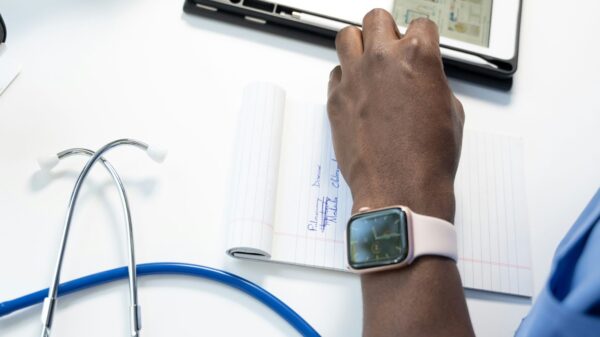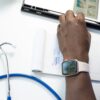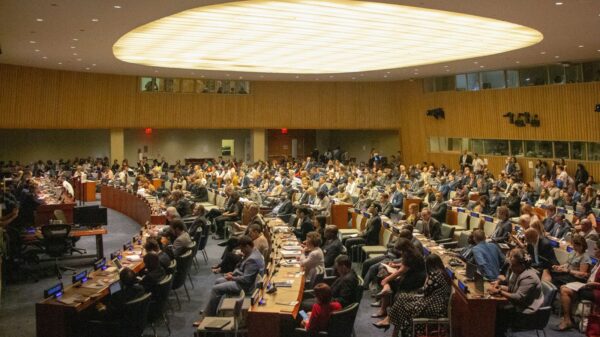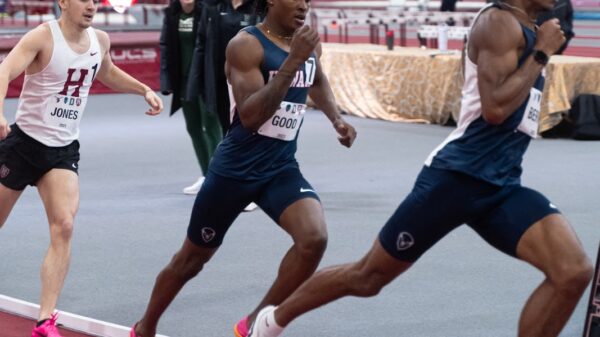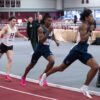Early one December 2021 night, Cameron Patterson was driving to a high school basketball game on Ringgold, Georgia, roads that were freshly showered with rainwater.
Patterson said he was driving at least 10 miles per hour more than the speed limit when his Honda Accord hydroplaned off the road and flipped three to four times over a grass field. When it stopped, the car was smoking and his knees were twisted onto the steering wheel, Patterson recounted.
He threw himself out of the car to lay on the ground and said that is when he felt the pain in his back. His back was bent, shaped almost like a question mark, he described.
Life360, a family tracking app that Patterson had on his phone, automatically called first responders to the scene. Since Patterson was only minutes away from his house, a nearby neighbor also called the police who arrived about 10 minutes after the crash. Patterson was transported to the hospital that night and went into surgery the next morning.
The thoracic and lumbar segments of his spine, which stretch from just above the buttocks to just below the neck, were areas where his vertebrates were fractured and dislocated. His vertebrates were subsequently pushing against his spinal cord, consequently blocking brain waves and blood flow to his brain, he said.
As Patterson was getting loaded into the ambulance, he overheard an emergency medical technician (EMT) tell his stepfather that he might never walk again.
As for the recovery process, Patterson said, “It’s something that you probably wouldn’t wish anybody else would go through.”
After the Dec. 10 crash, Patterson spent 12 days in the neurointensive care unit at Erlanger hospital in Chattanooga, Tennessee, where, in the first week, he could not pass bowel movements and started using urinary catheters. He would oftentimes require assistance from nurses and medical instruments to defecate and bathe. Patterson also had to sit in bed for 23 hours each day, setting aside about an hour to attempt walking certain distances with assistance from a four-wheel walker.
He was then transferred to an Atlanta rehabilitation center called Shepherd Center on Dec. 21.
When he got there, he had partial feeling in his thighs and calf and no feeling in his feet, and he could only walk 30 to 40 feet at a time. By the time he left on Jan. 19, Patterson could partially feel the back of his thighs and calves and could feel the top of his thighs and could wiggle his toes and walk with assistance for about 10 minutes before needing to rest, as his thighs were essentially the only muscles that activated.
“My progress was crazy,” the 20-year-old said. “Looking back on it, I’m very lucky – it could’ve been worse.”
Patterson, a junior political science and philosophy double major, was diagnosed as an incomplete paraplegic as a result of the crash. He has spent the past seven weeks navigating his return to campus while learning to live with his disabilities.
Wiggling his toes was the last progress Patterson made, and he’s now in his 10th month after the injury. According to research company FlintRehab, as time passes for people with spinal cord injuries, the probability for a full recovery decreases.
“In terms of getting any more feeling back, I don’t really hold my breath anymore,” Patterson said. “I can’t really sit here and sulk and just let time go by – when you get into an accident or you have something happen, it makes you realize that time is very precious, so you don’t want to worry about things that are out of your control.”
As an incomplete paraplegic, Patterson has sustained partial damage to his spinal cord and has the ability to walk. He has slight feeling in his outer calf muscles, thighs and the tops and bottoms of his feet. In the months after the crash and to this day, the primary way Patterson gets around is with the help of a wheelchair, but he sometimes uses crutches, a bike or an electric scooter.
Sean Patterson, his father, recalled the way he believed Patterson was affected by the recovery process.
“There were times where it seemed, at least to me, that Cameron was losing some confidence in himself – those moments are hard to see. When those moments of doubt creep in for him, it kind of makes it hard for me,” he said.
In the spring, following rehabilitation, Patterson took classes at American Military University, an online university system, while he debated returning to Howard for the fall 2022 semester of what would be his junior year.
“Up until the last few weeks before moving in I was like ‘do I really want to do this?’” he said. He pondered over Howard’s steep hills, potentially icy pathways during wintertime and old buildings that do not accommodate wheelchair usage as reasons to not return.
Patterson was considering transferring to Morehouse College or another Atlanta school to be closer to home.
Sean Patterson said that he and his wife’s main concern was for their son to get back to campus. “We just felt like that was a hugely consequential step in his recovery because while on campus, there isn’t time to feel bad for yourself,” he said, “you just got to take care of your business.”
Patterson’s philosophy about the situation ultimately aligned with his father’s, “I realized I gotta start just putting myself out there,” he said. “I knew if I didn’t put myself out there, when I got to campus it was going to be very hard to adjust.”
Despite the growth mindset, Patterson’s experience as an incomplete paraplegic student in a wheelchair involved varied challenges – securing a proper housing accommodation was among the firsts.
Students can submit accommodation applications to the Office of Student Services via a PDF, which can be found on the Student Affairs website. Disabilities can range from anxiety to mobility impairment, and accomodations can range from having additional time to complete exams and assignments to having access to certain parking spots, according to the site.
Patterson, who also has Attention Deficit Disorder, submitted his accommodation application on April 28. He said that he was told by Office of Residential Life representatives that once his application was accepted, he could pick whichever residence he felt most accommodating.
When the application was approved on July 5, Patterson chose George W. Cook Hall, which was accepted. However, on Aug. 3, Patterson received an email from an Office of Residential Life representative explaining that Cook Hall would not be accessible for him because the hallways, room and doorways were not wide enough for his wheelchair.
“It upset me just a little bit just because they never asked me what my wheelchair dimensions were, and I definitely know that there are people that are bigger, wider than me in this wheelchair, so it didn’t make sense,” he said.
Patterson asked for the dimensions, and after going back and forth between representatives, he mentioned that he would get a lawyer involved, “…and as soon as I said that,” he said, “they sent me my dorm room number and told me that I would be welcome there.”
In the end, Patterson was officially notified that he would be in a ‘single’ first-floor room in Cook Hall on Aug. 5, three days before he moved in on Aug. 8. His backup plan was to stay with eight friends at an apartment in D.C.
The Office of Disability Support Services received over 300 accommodation applications for this semester, according to Director of Student Services Dr. Paris Adon, who sensed this was “significantly higher” than prior semesters, citing COVID-19, heightened anxiety and depression as reasons for why.
Adon said that the office tries to hold itself to a standard of taking no longer than two weeks to approve or disapprove accommodation applications, but noted that it could take up to six weeks depending on the number of applications the office receives.
The natural geography of Howard’s campus has been less than accommodating for Patterson. Commuting between different buildings in his wheelchair or on foot has been, “a little bit tiring,” he described.
“There’s terrible hills everywhere, and I think my parents were very concerned about whenever it starts getting cold and ices over.” His thighs do most of the work when walking, “so it really just feels like hitting ‘Leg Day’ every single time,” he said.
Patterson also mentioned how there are locational inconsistencies with sidewalk slopes that accommodate wheelchair users. Between Andrew Rankin Memorial Chapel and Founders Library, for example, there is a sidewalk slope leading into the street and towards the Yard, but directly on the other side of the street is a curb with no slope.
“There’s just a lot of things like that,” he said. “The sidewalks for example – the cracks and bumps everywhere… If I run into something and it jerks me forward and I flex real quick, that real quick flex will just make me pee on myself,” Patterson said, due to him losing control of his bladder after his injury.
Noah Adeyemi, an 18-year-old freshman computer science major with multiple sclerosis, also identified uneven sidewalks around campus to be an issue, specifically how there are potholes on the sidewalk in front the Subway, Potbelly and other eateries on Georgia Avenue.
“Founder’s Library – there’s an elevator in the back I think where storage is,” he said, “But when I went there it wasn’t working.”
With multiple sclerosis, Ademeyi said he struggles with fine motor skills, writing legibly, walking in a straight line, carrying items and aspects of speech. He was diagnosed with the disease in 2018, and the primary way he gets around is with a wheelchair.
On the evening of Oct. 12, Adeyemi, Patterson and a few other students with disabilities gathered in the community area of College Hall South to point out what they believed were Americans with Disabilities Act (ADA) accessibility violations on campus. The supposed violations were presented to Howard University Student Association Senate (HUSA Senate) Senator Jayda Peets as part of a focus group.
In the meeting, which was facilitated by Patterson, students spoke about low railings, nonfunctioning handicap push buttons, scooters in front of pathways and accessibility entrances, tight bathroom spaces, rugged pathways and sidewalks and a lack of or inoperable elevators in some buildings, among other issues. Some students also mentioned their inability to evacuate down residence stairs in the case of a fire alarm, leaving them conflicted about whether or not to use the elevator.
Myles Calhoun, a 17-year-old freshman, was one of those students at the gathering. Before Calhoun was born, he was diagnosed with spina bifida, a condition where a developing baby’s spinal cord does not form properly, according to the CDC. He has functioning issues in his legs, ankles and feet as well as his back and a few of his organs.
Calhoun, an Annex resident, said he walks about 80 to 90 percent of the time with the assistance of leg braces. When he walks, Calhoun sometimes experiences pain and exhaustion. When he is in a wheelchair, “there’ll be moments where I almost faceplant,” he said, due to the “varying textures” and “raised edges” on the sidewalk on Fourth St NW, which stretches from College Hall South to the Harriet Tubman Quadrangle residence entrance.
Patterson has been vocal about some of these accessibility issues at HUSA Senate meetings and other forums. He said there are people at Howard who are not as mobile as he is, so he feels more compelled to speak on their behalf rather than his own.
He hopes to use his instagram @_cameronpatterson to connect with students who share similar disabilities or concerns about accessibility on campus.
“At the end of the day,” he said, “If I want more people like me on campus, then I know it needs to be more welcoming.”
According to Director of Operations, Strategy and Communications Jarrett Carter, over 90 percent of Howard’s buildings were constructed before the ADA was enacted in 1991.
Since then, he said, Howard has constructed seven new buildings as well as ramps, wider stalls for restrooms, adjustable chairs and desks in workspaces, handicap push buttons and properly heightened water coolers, among other things in compliance with the Act.
In regards to the older buildings, Carter noted that they “can be so costly, the strategy of reasonable accommodations complements our financial strategy of stabilizing student tuition costs and prioritizing resources for student aid, faculty salary and benefits and other forms of student support.”
As far as any issues there might be with on-campus pathways, Howard can address them if they are “formally reported and are within its jurisdiction,” Carter said. “All pathways are subject to wear from weather and pedestrian traffic, but reporting issues is key.”
Off-campus sidewalks are the responsibilities of the District of Columbia Department of Transportation, and Howard “would face hefty fines and penalties,” if it made any changes to them, Carter said.
Overall, the “Howard Forward strategic plan is the transformation of our physical campus over the next few years,” he said. “All new buildings will naturally be ADA compliant, and in many cases will replace older buildings where compliance is more costly to maintain.”
Outside of the structural aspect of being on campus, Patterson believes that some students could be more socially welcoming, and that in many cases, the challenges he encounters on campus are “more about the social interactions than the actual campus,” he said.
“They do say a few things that are a little bit out of the ordinary,” Patterson said, “You can sort of tell whenever people are trying to be rude…”
Calhoun said, “People will say they understand, but then they’ll make comments rooted in ignorance because they don’t know any better… There is a lot of ignorance and stigmatization,” he said, “My friends didn’t know it wasn’t OK to call me Drake from ‘Degrassi’ or Stephen Hawking.”
Patterson said that in each interaction where something insensitive might be directed at him, he takes it at face value and does not read much into it because “I don’t want to sit there and let that ruin my day, my week or my time on campus,” he said.
Patterson also said that he would appreciate a student organization or organized gathering where disabled students can build friendships and form a cohesive community. “It feels nice whenever you can bond with other people who go through the same things as you,” he said.
Both Patterson and Calhoun emphasized that they would appreciate it if more students were educated about disabilities and disabled students in general. Adon spoke about a plan to help accomplish this.
“We’re trying to do more education around what it means to have a disability,” Adon said. “We’re going to start doing gatherings at different dorms. We’re trying to do some information sessions for students on what it means to have a disability and what it looks like, and what the documentation looks like to have a disability.”
The sessions will take place at College park, Woodley park and Mazza Grand Marc apartments, he said. His office is also working on sending out educational videos for students. Adon said he and his office are also trying to set up a student mixer that will hopefully take place in the lower Quad in spring where students with and without disabilities will listen to presentations on required disability assessments and documentation as well as available accommodations.
Copy edited by Jasper Smith








